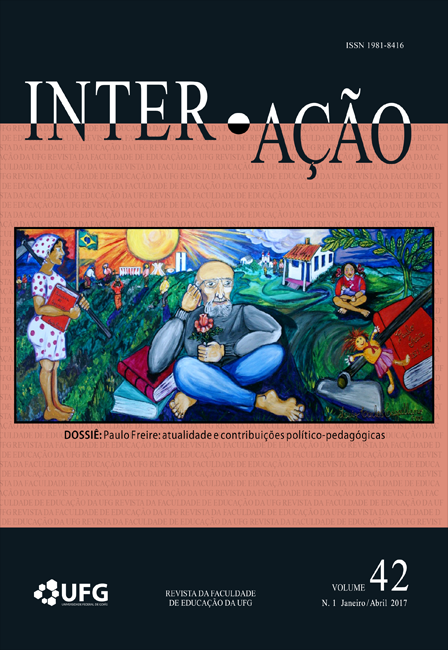O DIÁLOGO TRANSFORMADOR A PARTIR DA PEDAGOGIA DA ESPERANÇA DE PAULO FREIRE
DOI:
https://doi.org/10.5216/ia.v42i1.44030Palavras-chave:
diálogo, democracia, educação, unidade na diversidadeResumo
O presente trabalho se caracteriza por uma pesquisa bibliográfica que pretendeu responder a um dos objetivos da dissertação de mestrado “O diálogo em Paulo Freire: uma análise a partir da Pedagogia do oprimido e da Pedagogia da esperança”, referente ao conceito de diálogo na Pedagogia da esperança. Para a sua realização foi utilizada a metodologia de analise de conteúdo que foi elaborada a partir das palavras e trechos que se relacionaram com os radicais dial. e diál. durante toda a obra. O diálogo na Pedagogia da esperança apresenta características que representam o contexto e a vivência do autor na escrita da Pedagogia do Oprimido e da referida obra aqui abordada, definindo-se como a grande transformação do mundo por meio da democracia, da unidade na diversidade, da/o professora/a, da consciência, do aprendizado e do silêncio.
Downloads
Publicado
Versões
- 2026-02-03 (3)
- 2026-02-03 (2)
- 2017-06-09 (1)
Como Citar
Edição
Seção
Licença
Copyright (c) 2017 Revista Inter Ação

Este trabalho está licenciado sob uma licença Creative Commons Attribution-NonCommercial 4.0 International License.
A Inter-Ação utiliza como base para transferência de direitos a licença Creative Commons Attribution 4.0 para periódicos de acesso aberto (Open Archives Iniciative - OAI). Por acesso aberto entende-se a disponibilização gratuita na Internet, para que os usuários possam ler, baixar, copiar, distribuir, imprimir, pesquisar ou referenciar o texto integral dos documentos, processá-los para indexação, utilizá-los como dados de entrada de programas para softwares, ou usá-los para qualquer outro propósito legal, sem barreira financeira, legal ou técnica.
Autores que publicam neste periódico concordam com os seguintes termos:
1) Autores mantém os direitos autorais e concedem à revista o direito de primeira publicação, com o trabalho simultaneamente licenciado sob a Licença Creative Commons Attribution que permite o compartilhamento do trabalho com reconhecimento da autoria e publicação inicial nesta revista.
2) Autores têm autorização para assumir contratos adicionais separadamente, para distribuição não-exclusiva da versão do trabalho publicada nesta revista (ex.: publicar em repositório institucional ou como capítulo de livro), com reconhecimento de autoria e publicação inicial nesta revista.
3) Autores têm permissão e são estimulados a publicar e distribuir seu trabalho online (ex.: em repositórios institucionais ou na sua página pessoal) a qualquer ponto antes ou durante o processo editorial, já que isso pode gerar alterações produtivas, bem como aumentar o impacto e a citação do trabalho publicado.















